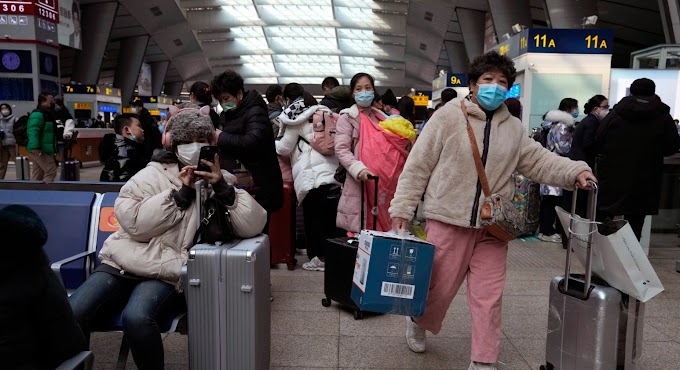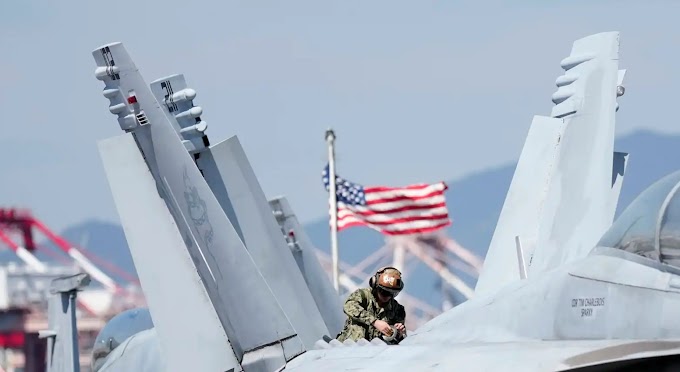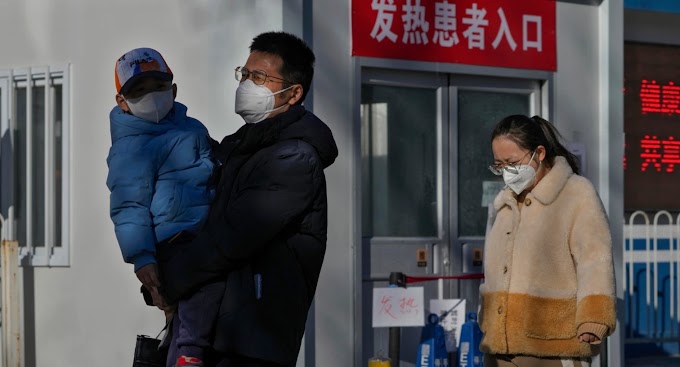Yuwen Vision Xi Jinping's will to power is defeated by the economy
 |
| People in Beijing took to the streets and held up white papers to protest the authorities' strict epidemic prevention and control measures. (November 27, 2022) |
Editor's Note: This is an opinion piece written by Deng Yuwen for Voice of America. This guest commentary does not reflect the views of Voice of America. Reprinters please indicate that they are from Voice of America or VOA.
The degree of liberalization of China's epidemic prevention and control has exceeded expectations. Many people credit the "blank paper movement" with "credit". One of the immediate appeals of the movement is to abandon zeroing and loosen control. During the talks with European Council President Michel, Xi Jinping also admitted that young people took to the streets to protest because of their frustration in the three-year epidemic, which is actually tantamount to admitting the failure of eradicating the epidemic. In view of the strict control over society in Xi's era, the sudden and large-scale outbreak of the "white paper movement" without warning will have a strong psychological impact on Xi. This may directly cause the authorities to abandon the zero-clearing policy in response to public opinion.
However, pressure from the economy may be a deeper and more critical factor. Let's just say, if China's economy is doing well, maintaining robust growth like India's or Vietnam's, will Xi back down from the demands of the protest movement? It is estimated that it will be difficult.
More than a month ago, I predicted that if the Chinese economy performed well in the fourth quarter, it is likely that the epidemic control will be released after the two sessions next year; It is only possible to let go of the moon. The reason I make this judgment is that if the economic situation is good, then in Xi’s view, his set of clearing methods is correct, and can achieve both epidemic prevention and economic development, just like what he did during the Delta virus stage . In the first stage of the fight against the epidemic, the containment measures adopted by China not only controlled the epidemic, but at the same time the economy recovered rapidly. He was considered a so-called "top student" in the international fight against the epidemic. It was this perception that made him reluctant to give up Clearing, at least one of the reasons. However, if the economic situation deteriorates, it means that his idea of having both the fish and the bear's paw cannot be realized, and he is doomed to give up one end. In terms of the impact on society and the stability of his personal power, protecting the economy is obviously much more important than keeping zero.
Unfortunately for Xi, the Chinese economy will fare very badly in the fourth quarter of this year. In the first quarter, because the economic growth rate in the same period last year was too low, there was relatively high growth; in the second quarter, due to the closure of Shanghai, the economy almost stopped growing; in the third quarter, it improved and resumed growth, although the growth rate was still very low. The authorities pinned their hopes on the fourth quarter. If the epidemic did not recur and local governments imposed random restrictions, a growth rate of four percentage points in the fourth quarter would be possible. Although the annual growth target of 5% set by the authorities would not be reached, the Should be able to achieve a 3.5% growth rate.
However, the economic situation in the fourth quarter was much worse than the authorities expected. According to the data disclosed by five economists including Yao Yang, Dean of the National Development Institute of Peking University, who wrote to the authorities before the announcement of the new 11 articles, the three drivers of consumption, investment, and exports declined in an all-round way in October. Although manufacturing investment is resilient, its growth has also slowed down, with real estate, exports and consumption seeing the largest declines. In October, the total retail sales of social consumer goods -0.5% year-on-year, down 3 percentage points from the previous month; real estate sales -23.7% year-on-year, down 9.5 percentage points from
the previous month; exports (in US dollars) -0.3% year-on-year, down from the previous month 6 percentage points. It is especially difficult for small and micro enterprises, which are the main source of employment. In October, the unemployment rate of the 16-24 population survey was as high as 17.9%, and the actual situation may be even more severe. Affected by the economic downturn and corporate layoffs, the employment situation of college students is very severe.
The situation in November was even worse. The PMIs of the managers' indexes of large, medium and small enterprises were 49.1%, 48.1% and 45.6% respectively, down 1.0, 0.8 and 2.6 percentage points from the previous month. It can be seen that if the lockdown is not lifted, the economic growth rate in the fourth quarter will drop sharply compared with the third quarter, which will affect the economic development of next year.
An internal research report of the Bank of China also revealed that in the first eight months of this year, the local general fiscal budget gap reached 10.2 trillion yuan, much higher than the central general fiscal budget gap of 6 trillion yuan, an increase of 65% over the same period last year. In terms of provinces, except for the fiscal revenue and expenditure gaps of Shanxi and Henan, which narrowed by 15.9% and 0.3% respectively, the fiscal revenue and expenditure gaps of other places all expanded to a certain extent. Among them, the fiscal revenue and expenditure gaps of Zhejiang,
Beijing, and Guangdong, the three major economic powerhouses, expanded the most, reaching 1619.2%, 293.9%, and 102.7% respectively, while Shanghai's fiscal surplus decreased by 79.2% compared with the same period last year. The report attributed the expansion of the local fiscal budget gap to the unexpected impact of the epidemic and the sluggish land market, which led to a sharp decline in land transfer revenue. The latter is actually influenced by the former.
Fiscal revenues continue to be under pressure, while expenditures continue to expand. Only healthcare expenditures accounted for the proportion of national public fiscal expenditures, which remained at about 8% in the first eight months, higher than the same period in history.
The report also pointed out three consequences of excessive financial pressure. First, the risk of default increased. The ratio of bond balances to income in China’s 31 provincial-level administrative regions was close to the warning line of 120% set by the Ministry of Finance; second, it restricted the growth of infrastructure investment. Weakening the ability of the government to promote economic development in the medium and long term; third, the public sector and economic and social development are facing obstacles.
There is a popular view that Xi Jinping doesn't care about economic performance, but the preservation of rights is what he values most. If we say that Xi’s power is not yet very stable, the economic downturn is not too fast and has not had a great impact on the exercise of government capabilities, his priority is to focus on his own power, just like before the epidemic; then, now he He has been re-elected three times and has formed an all-in-one "Xi's cabinet". The will to power has been implemented without hindrance at the top, but the economy is in a mess. Not only has it affected his expansion plan to push China's power to the world, but it has also affected Basic people's livelihood and social stability is likely to have a greater impact on his regime. At this time, how could he not make the economy the focus of government work?
Some people may still question, is the Chinese economy really so bad? The answer should be in the affirmative, otherwise, official scholars such as Yao Yang would not call on the authorities to let go of zero at this time, and suggested that the economic growth target for next year should be set above 5%, in order to re-send a political signal to officials at all levels: put work The focus turns to the economy. Xi wants to be a promising "monarch". The 20th National Congress of the Communist Party of China proposed the goal of so-called Chinese-style modernization. It is necessary to explore another modernization path for human beings. Without this, Chinese-style modernization is nonsense.
So the economy is a hard indicator. And now a direct consequence of the recession is the fiscal crisis. Regardless of other things, according to the aforementioned report of the Bank of China, if the normalized nucleic acid testing covers 900 million urban population, it will bring about 0.7 trillion fiscal expenditures for the whole year, which is an extra burden for local governments. The governments at the county and township levels in China have been bankrupt long ago and cannot afford to support nucleic acid testing. This is why Shandong and other places rely on debt issuance to build shelter hospitals. But sooner or later, the debt will have to be paid back. If the central government has to borrow a lot to survive, the probability of a systemic financial crisis is very high. And if the clearing continues for another half a year, this situation is not impossible.
The economy is fundamental. This statement applies to any government, but it is especially important to the CCP. Since Mao lost its ideological appeal, the CCP has actually placed the legitimacy of its regime on economic growth and the resulting prosperity of the country and the improvement and improvement of people's lives. Although there were deviations at some stages in the 30 years before Xi came to power, this trend has generally been maintained. In the first five years of Xi Jinping’s time, he also wanted to make a difference in the economy.
He formulated an ambitious master plan for China’s reforms, implemented supply-side reforms, and personally appointed the director of the Central Deepening Reform Group. However, anti-corruption and centralization have hit The enthusiasm of the officials made his reform plan come to naught. In the next five years, due to the deterioration and confrontation between China and the United States, and to ensure the success of the 20th National Congress of the Communist Party of China, Xi's focus turned to protecting power and responding to pressure from the international community.
During this period, he launched an unprecedented suppression of capital. Especially in the three years of the epidemic, governments at all levels are busy controlling the epidemic. Although Xi Jinping proposed to balance economic development and epidemic prevention, in fact, this cannot be achieved. The price of forcibly clearing the blockade is the complete shutdown of the economy.
 |
| Citizens of Beijing line up in front of a wall of slogans promoting Xi Jinping Thought for an accounting test. (December 5, 2022) |
However, Xi Jinping’s transformation of the CCP in the past ten years has given him an illusion. He is too superstitious about the will to power. There will be some twists and turns, but in the end nothing can't be done. His anti-corruption campaign, the suppression of capital, and the Sino-US trade war have all strengthened his perception. After the outbreak, he also believed that with his strong will to power, he could control the epidemic, tame society, and tame the economy. But he miscalculated this time. Economic rationality, economic logic, and economic power are much stronger than his personal will to power. People—even the so-called great leaders—cannot be completely defeated against the laws of economics.







